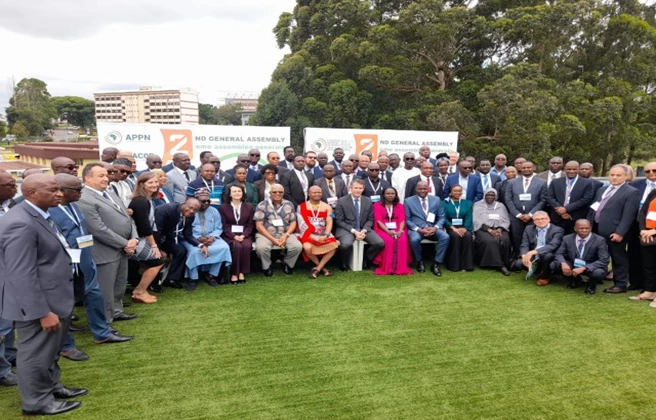 Water Projects, Mozambique. Massaca is a small settlement on the way to Pequenos de Libombos where as in most of the country people have to collect their water from either a river or a supply point. The water from the resevoir is also used to irrigate the local agriculture. John Hogg / World Bank
Water Projects, Mozambique. Massaca is a small settlement on the way to Pequenos de Libombos where as in most of the country people have to collect their water from either a river or a supply point. The water from the resevoir is also used to irrigate the local agriculture. John Hogg / World Bank
African nations spend an average of 17 percent of GDP on procurement of public goods, works, and service contracts. This illustrates the crucial role that public procurement plays in the context of Africa’s economic development and in influencing its broader socioeconomic environment. Economic development of any country significantly depends on the effectiveness of its public expenditure and the performance of its public procurement system.
Public procurement is a complex development tool that cuts across all sectors of economy. It creates many opportunities and challenges. These opportunities include timely delivery of high-quality public services, promotion of sustainability through a focus on “green” products and services; supporting micro, small, and medium enterprises; innovation; enhancing trade and competitiveness; strengthening financial inclusion, especially for vulnerable and disadvantaged groups; improving transparency through the use of new technologies; and reducing corruption.
Losses through inefficiency and corrupt practices are key procurement challenges. All African nations strive to continuously develop their public procurement systems for better performance and for effective contribution to their economic development. They seek answers to questions such as: How did the procurement systems perform during the pandemic? What did member countries learn? How will they improve? How do procurement systems factor the security challenges in the region? How to use new and innovative technologies in public procurement?
In November 2022, public procurement leaders from 38 African countries participated in the Second General Assembly of the African Public Procurement Network (APPN) in Mbabane, Eswatini. Minister of Finance of Eswatini, the Hon. Neal Rijkenberg welcomed all 120 participants and while emphasizing the importance of procurement—especially locally and regionally-resourced procurement— in Africa’s development. The World Bank team highlighted the importance of public procurement in regional integration and emphasized the role of the APPN in regional development.
Conclusions Drawn
The General Assembly debated key issues that affect the development and performance of a country’s procurement system to reach the following conclusions:
- Global Procurement Partnership and Sustainable Development. Application of value for money is contextual and, therefore, potentially subject to wide divergence between and among countries depending on the relative mix of national socioeconomic priorities. Each country will inevitably face internal trade-offs and therefore a complex balancing act is constantly required in public procurement.
- Public procurement and its relevance for development and economic growth in Africa. The use of public procurement as a strategic tool helps generate fiscal savings and sustainable outcomes, including promotion of local markets and jobs.
- Factoring in the security challenges in the region and identifying strategies to mitigate them during procurement planning stage are essential.
- Focus Groups for implementing Electronic Government Procurement (E-GP) in Africa. With the creation of three E-GP Focus Groups in Africa, the APPN platform provides a great opportunity for African countries to help each other move forward with the E-GP agenda in the interests of increased transparency, efficiency, and accountability in public procurement.
- Using public procurement data to support sustainable and inclusive economic development. Countries need to adopt data collection tools that facilitate its collection, analysis, use and dissemination.
- Public Procurement in African countries responding to challenges created by the pandemic and the lessons learned for the future. It was agreed that emergency procurements must be conducted in accordance with the public procurement laws and regulations in force.
- The value of both the core Methodology for Assessing Procurement Systems (MAPS) and its supplementary modules to enhance public procurement systems was confirmed. However, it was concluded that the MAPS Secretariat should speed up its quality assurance role and it was also decided to establish a MAPS focus group.
- Sustainable and circular procurement. Countries need to develop a procurement framework that promotes climate-responsive and socio-economic procurement objectives.
- Professionalization of public procurement. Efforts to professionalize procurement must continue, and, as a way forward, establish a focus group on professionalization.
- Harmonization of Public Procurement Laws and Regulations in West African Economic and Monetary Union (WAEMU) countries. Other subregions need to learn from the WAEMU approach to harmonization and set up concrete strategies to move forward their public procurement harmonization agenda.
One of the most important takeaways was the need to continue the dialogue between and beyond African countries to learn about the use of public procurement as a strategic tool to promote economic growth and sustainable development. All participants expressed their commitment to keeping the APPN platform alive. They elected Cote d’Ivoire as the new APPN chair and to host the Third General Assembly in 2023.





Join the Conversation